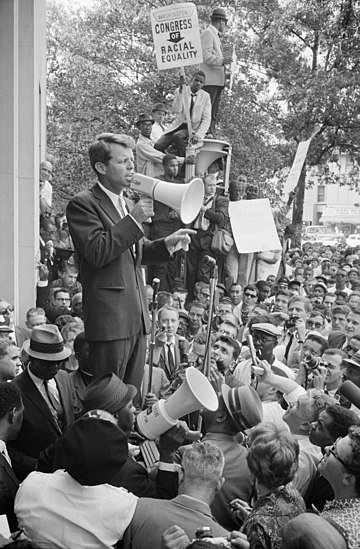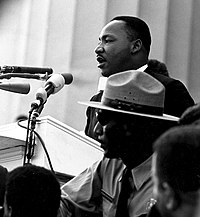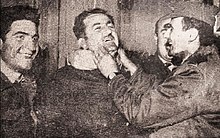The 1960s Portal
The 1960s became synonymous with the new, radical, and subversive events and trends of the period. In Africa the 1960s was a period of radical political change as 32 countries gained independence from their European colonial rulers. Some commentators have seen in this era a classical Jungian nightmare cycle, where a rigid culture, unable to contain the demands for greater individual freedom, broke free of the social constraints of the previous age through extreme deviation from the norm. Christopher Booker charts the rise, success, fall/nightmare and explosion in the London scene of the 1960s. However, this alone does not explain the mass nature of the phenomenon. Several nations such as the U.S., France, Germany and Britain turned to the left in the early and mid 1960s. In the United States, John F. Kennedy, a Keynesian and staunch anti-communist, pushed for social reforms. His assassination in 1963 was a stunning shock. Liberal reforms were finally passed under Lyndon B. Johnson including civil rights for African Americans and healthcare for the elderly and the poor. Despite his large-scale Great Society programs, Johnson was increasingly reviled by the New Left at home and abroad. The heavy-handed American role in the Vietnam War outraged student protestors across the globe, as they found peasant rebellion typified by Ho Chi Minh and Che Guevara more appealing. Italy formed its first left-of-center government in March 1962 with a coalition of Christian Democrats, Social Democrats, and moderate Republicans. Socialists joined the ruling block in December 1963. In Britain, the Labour Party gained power in 1964. In Brazil, João Goulart became president after Jânio Quadros resigned. This is a Featured article, which represents some of the best content on English Wikipedia..
Aftermath is a studio album by the English rock band the Rolling Stones. The group recorded the album at RCA Studios in California in December 1965 and March 1966, during breaks between their international tours. It was released in the United Kingdom on 15 April 1966 by Decca Records and in the United States in late June or early July 1966 by London Records. It is the band's fourth British and sixth American studio album, and closely follows a series of international hit singles that helped bring the Stones newfound wealth and fame rivalling that of their contemporaries the Beatles. Aftermath is considered by music scholars to be an artistic breakthrough for the Rolling Stones. It is their first album to consist entirely of original compositions, all of which were credited to Mick Jagger and Keith Richards. The band's original leader Brian Jones reemerged as a key contributor and experimented with instruments not usually associated with popular music, including the sitar, Appalachian dulcimer, Japanese koto and marimbas, as well as playing guitar and harmonica. Along with Jones' instrumental textures, the Stones incorporated a wider range of chords and stylistic elements beyond their Chicago blues and R&B influences, such as pop, folk, country, psychedelia, Baroque and Middle Eastern music. Influenced by intense love affairs, tensions within the group and a demanding touring itinerary, Jagger and Richards wrote the album around psychodramatic themes of love, sex, desire, power and dominance, hate, obsession, modern society and rock stardom. Women feature as prominent characters in their often dark, sarcastic, casually offensive lyrics. (Full article...)This is a Good article, an article that meets a core set of high editorial standards.
The 1963 Syrian coup d'état, referred to by the Syrian government as the 8 March Revolution (Arabic: ثورة الثامن من آذار), was the seizure of power in Syria by the military committee of the Syrian Regional Branch of the Arab Socialist Ba'ath Party. The planning and the unfolding conspiracy of the Syrian Ba'athist operatives were prompted by the Ba'ath party's seizure of power in Iraq in February 1963. The coup was planned by the military committee, rather than the Ba'ath Party's civilian leadership, but Michel Aflaq, the leader of the party, consented to the conspiracy. The leading members of the military committee throughout the planning process and in the immediate aftermath of taking power were Muhammad Umran, Salah Jadid and Hafez al-Assad, who belonged to the minority Alawite community. The committee enlisted the support of two Nasserists, Rashid al-Qutayni and Muhammad al-Sufi, and the independent Ziad al-Hariri. The coup was originally planned for 7 March, but was postponed one day after the government discovered where the conspirators were planning to assemble. After the coup, the Ba'athist Military committee initiated a series of purges that altered the structure of the Syrian armed forces by replacing 90% of its officer corps with Alawites. (Full article...)Selected picture - United States Attorney General Robert F. Kennedy speaking at a civil rights demonstration organized by the Congress of Racial Equality (CORE) on the steps of the Department of Justice building in June 1963. Kennedy's tenure (1961–64) was easily the period of greatest power for the office; no previous officeholder had enjoyed such clear influence on all areas of policy during an administration. As Attorney General, Kennedy pursued a relentless crusade against organized crime and consistently championed civil rights for African Americans, the latter so much so that he commented, in 1962, that it seemed to envelop almost every area of his public and private life.
Did you know -
Related portalsThis is a Featured article, which represents some of the best content on English Wikipedia..
George Harrison MBE (25 February 1943 – 29 November 2001) was an English musician, singer and songwriter who achieved international fame as the lead guitarist of the Beatles. Sometimes called "the quiet Beatle", Harrison embraced Indian culture and helped broaden the scope of popular music through his incorporation of Indian instrumentation and Hindu-aligned spirituality in the Beatles' work. Although the majority of the band's songs were written by John Lennon and Paul McCartney, most Beatles albums from 1965 onwards contained at least two Harrison compositions. His songs for the group include "Taxman", "Within You Without You", "While My Guitar Gently Weeps", "Here Comes the Sun" and "Something". Harrison's earliest musical influences included George Formby and Django Reinhardt; subsequent influences were Carl Perkins, Chet Atkins and Chuck Berry. By 1965, he had begun to lead the Beatles into folk rock through his interest in Bob Dylan and the Byrds, and towards Indian classical music through his use of Indian instruments, such as the sitar, which he had become acquainted with on the set of the film Help! He played sitar on numerous Beatles songs, starting with "Norwegian Wood (This Bird Has Flown)". Having initiated the band's embrace of Transcendental Meditation in 1967, he subsequently developed an association with the Hare Krishna movement. (Full article...)This is a Good article, an article that meets a core set of high editorial standards.
Félix Houphouët-Boigny (French: [feliks ufwɛ(t) bwaɲi]; 18 October 1905 – 7 December 1993), affectionately called Papa Houphouët or Le Vieux ("The Old One"), was an Ivorian politician and physician who served as the first president of Ivory Coast from 1960 until his death in 1993. A tribal chief, he worked as a medical aide, union leader, and planter before being elected to the French Parliament. He served in several ministerial positions within the French government before leading Ivory Coast following independence in 1960. Throughout his life, he played a significant role in politics and the decolonisation of Africa. Under Houphouët-Boigny's politically moderate leadership, Ivory Coast prospered economically. This success, uncommon in poverty-ridden West Africa, became known as the "Ivorian miracle"; it was due to a combination of sound planning, the maintenance of strong ties with the West (particularly France) and development of the country's significant coffee and cocoa industries. However, reliance on the agricultural sector caused difficulties in 1980, after a sharp drop in the prices of coffee and cocoa. (Full article...)
Selected article -Timothy Francis Leary (October 22, 1920 – May 31, 1996) was an American psychologist and author known for his strong advocacy of psychedelic drugs. Evaluations of Leary are polarized, ranging from bold oracle to publicity hound. According to poet Allen Ginsberg, he was "a hero of American consciousness", and writer Tom Robbins called him a "brave neuronaut". During the 1960s and 1970s, Leary was arrested 36 times. President Richard Nixon called him "the most dangerous man in America". As a clinical psychologist at Harvard University, Leary founded the Harvard Psilocybin Project after a revealing experience with magic mushrooms he had in Mexico in 1960. He led the Project from 1960 to 1962, testing the therapeutic effects of lysergic acid diethylamide (LSD) and psilocybin, which were legal in the U.S., in the Concord Prison Experiment and the Marsh Chapel Experiment. Other Harvard faculty questioned his research's scientific legitimacy and ethics because he took psychedelics himself along with his subjects and allegedly pressured students to join in. Harvard fired Leary and his colleague Richard Alpert (later known as Ram Dass) in May 1963. Many people only learned of psychedelics after the Harvard scandal. (Full article...)More Did you know (auto generated)
TopicsCategoriesWikiProjects
Associated WikimediaThe following Wikimedia Foundation sister projects provide more on this subject:
Discover Wikipedia using portals |





























